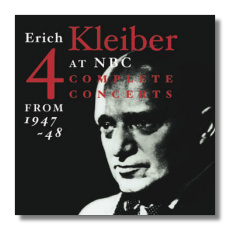
The Internet's Premier Classical Music Source
Related Links
- Latest Reviews
- More Reviews
-
By Composer
-
Collections
DVD & Blu-ray
Books
Concert Reviews
Articles/Interviews
Software
Audio
Search Amazon
Recommended Links
Site News
 CD Review
CD Review
Erich Kleiber

Complete NBC Concerts 1947-1948
- Alexander Borodin: Symphony #2 (12/20/1947)
- Carl Maria von Weber: Konzertstück in F minor (with Claudio Arrau, piano) (12/20/1947)
- Manuel de Falla: La Vida Breve (excerpts) (12/20/1947)
- Arcangelo Corelli: Concerto Grosso #8, "Christmas Concerto" (12/27/1947)
- Franz Schubert: Symphony #5 (12/27/1947)
- Johann Strauss, Jr. (12/27/1947):
- Tales from the Vienna Woods
- The Gypsy Baron: Overture
- Antonín Dvořák (1/3/1948):
- Carnival Overture
- The Wood Dove: Wedding Dance
- Piotr Ilyitch Tchaikovsky: Symphony #4 (1/3/1948)
- Ludwig van Beethoven: (1/10/1948)
- "Egmont" Overture
- Symphony #3, "Eroica"
NBC Symphony Orchestra/Erich Kleiber
Music & Arts CD-1112 AAD monaural 4CDs: 50:57, 56:16, 55:14, 55:26
Apparently this is the first commercial release of these broadcast performances from the sonically infamous Studio 8H. Arturo Toscanini was taking a de facto Christmas break from his NBC Symphony Orchestra, and invited Erich Kleiber to assume his place on the podium for four consecutive weeks. Although Kleiber's earlier musical experiences in the United States were not completely satisfactory – he felt he was not allowed sufficient rehearsal time in his 1930-31 appearances with the New York Philharmonic – he apparently was pleased with the prospect of performing some of his favorite repertoire with Toscanini's orchestra, and with being given ample time to prepare it thoroughly.
Kleiber was most famous for his masculine yet sensitive interpretations of the Viennese classics; Mozart and Beethoven are the dominant composers in his relatively sparse discography. The all-Beethoven disc is a spellbinder here. Kleiber made two studio recordings of the "Eroica," however, so this NBC reading is not a crucial addition to the Kleiber archives. (He omits an exposition repeat in the first movement, probably because the broadcast concerts were only an hour in length.) His fleet Schubert Fifth, while not as charming as it might be, is more gracious than Toscanini's 1953 recording from Carnegie Hall. (Listeners who like Toscanini often like Kleiber, and vice-versa, although I tend to prefer Kleiber in German repertoire and Toscanini elsewhere.) The two works by Johann Strauss, Jr. that end this second disc are marvelous examples of schmaltz without exaggeration. Kleiber passed his knack for this composer to his son Carlos Kleiber… but that's another story.
The Tchaikovsky Fourth receives a decidedly wild reading, full of the sorts of showy distortions that Stokowski imposed on this music in the name of interpretation. The audience enjoys it, even breaking into applause at the end of the first movement. I enjoyed it too; it put me on the edge of my seat wondering what the conductor would do next. Purists should pass it by, however. (This is another work that Kleiber recorded commercially.) The Borodin Second is hardly less idiosyncratic and equally exciting. It appears that Kleiber was too respectful to play around with Beethoven et al., but all bets were off outside of the Classical repertoire. All in all, while one might raise his or her eyebrows here and there during these four broadcast concerts, the musicianship is always exciting, and the playing is consistently assured. It is sad that today's conductors seem afraid to take chances with their interpretations; tastefulness is killing concerts and recordings.
Music & Arts has commissioned a well-written and comprehensive essay from Mark W. Kluge; it contains six pages of biography, and a nine-page listening guide of sorts. This four-disc set is being sold for the price of three discs, but as the program could have been presented on three discs anyway, this is not the savings that it initially appears to be. (I can understand Music & Arts's apparent desire to preserve the integrity of the broadcasts by segregating them one to a disc, however.) The restorations are by Maggi Payne; the sound, apart from some noise from the transcription discs, is not inferior to what is preserved on Toscanini's commercial recordings. Yes, the Studio 8H sound is drier than dry, but it is not inimical to these athletic performances.
Kleiber enthusiasts should snap this set up. Anyone nostalgic for the era in the United States when classical music belonged to everyone, or who is curious about the "great conductors" – and Kleiber was one, without a doubt – also will get much enjoyment from this release.
Copyright © 2002, Raymond Tuttle


















